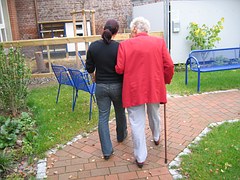From HIPAA to Health Insurance – 5 Things A Patient Advocate Wants You to Know About Elder Care

I have a daughter who was born in China. She is one of the lucky ones whose birthmother saved her life by abandoning her on the steps of a local hospital in a rural region of China. Millions more baby girls are believed to have been killed due to the enormous pressure on Chinese families to produce a son. Male children are not only the family’s financial security, but also the caretaker for elderly parents in later years.
Thankfully, here in United States we do not face such Sophie’s Choices—choosing a child’s life over our own future well-being. But as our healthcare system becomes more complex and less patient-friendly, the need and desire to have an adult child nearby who can help manage an aging parent’s healthcare in later years is increasingly becoming a necessity.
Taking Care of Your Aging Parents: The Harsh Reality
Sadly, this need has never been more challenging as middle-aged adults are finding themselves squeezed by the needs of their children and parents at the same time. According to a Pew Study, “nearly half (47%) of adults in their 40s and 50s have a parent age 65 or older and are either raising a young child or financially supporting a grown child (age 18 or older). And about one-in-seven middle-aged adults (15%) is providing financial support to both an aging parent and a child.” Add to that mix a geographical challenge—as increasingly more of us are living a non-commutable distance away—separated by not just miles but states or clear across the continent.
Perhaps not surprising to many, women make roughly 80 percent of health care decisions for their families and are more likely to be the caregivers when a family member falls ill. Many of these women have full-time jobs outside the home, have young children at home to care for, and don’t have the flexibility, to “drop everything” and tend to a family member in need—particularly if the need is long-term. So what’s a gal to do?
As the CEO of a team of patient advocates, I see this played out every week. The call to our office can start with “my mother had a stroke and I can’t get her doctors in the hospital to talk to each other and it is impacting her care.” Or maybe it’s “My dad always relied on mom to take him for his check-ups, manage his treatment for diabetes and other health-related problems, and with mom gone, he’s overwhelmed and we now have a gap.” There may be confusion as to coverage, in-network vs. out-of-network care, Medicare vs Supplemental or Medicare Part B coverage. For those in need of rehabilitation, the selection of acute, subacute or skilled nursing facilities can be very confusing and have a significant impact on recovery.
What You Need to Know Before a Parent Needs Medical Care or Hospitalization
Here are some of the things I suggest people put in place to minimize the impact on them should one (or both) of their parents become ill:
Make certain they have a good primary care physician and ideally one that is in a group practice. Having a doctor who knows your medical history and who can see what other specialty physicians in the group practice are doing on your behalf delivers integrated care—something that can be life-saving.
Maximize insurance options. If your income supports it and you are over 65, make certain you have Medicare Part B and a supplement. They are worth their weight in gold if you become sick. For those who do not have the financial resources, check with Medicare to see if you qualify for financial subsidies that will pay for Medicare Part B.
Have a complete record of the patient’s medical history. Medical error is the 3rd leading cause of death. If the doctor doesn’t know that Dad has had past urinary tract infections that appeared suddenly, causing a fever to jump to 102 within two hours and that the only drug that worked in the past was Levaquin, then the extra time spent sleuthing his case could be deadly.
Designate a medical proxy and have a HIPAA form complete so that the medical staff can talk to you. Having a point person in your family that everyone agrees should take the lead in managing Mom or Dad’s healthcare can limit the communication issues with doctors. HIPAA forms allow you to designate the people (can be several) who are allowed to know about the patient’s medical story and give doctors and nurses the permission they need before sharing any personal medical information. Having this executed ahead of time facilitates more meaningful discussions with the medical staff sooner than they might happen otherwise.
*For parents who travel for part of the year to other locations, consider an insurance plan that would transport them back to home if they become ill.
Our medical system has become a survival of the fittest experience. Those who proactively manage their family’s care before, during and after a medical crisis are the most likely to thrive and have the time to not only smell the roses, but also have many years to watch those roses grow.
